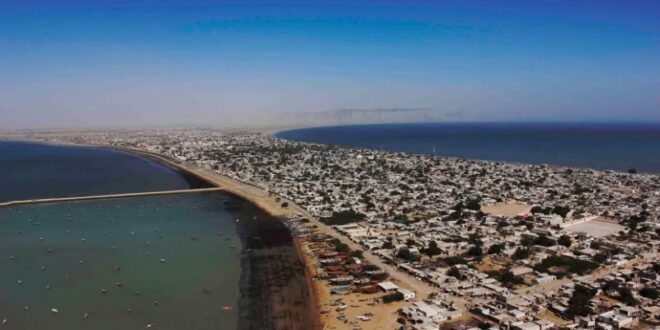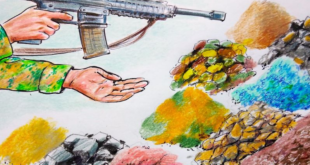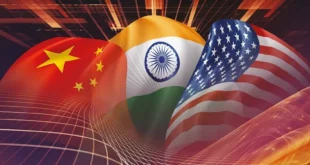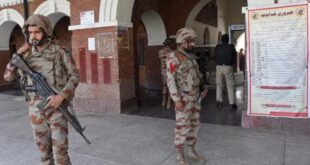The crown jewel of China’s Belt and Road Initiative (BRI) increasingly looks like a powder keg that has exploded.
Mass protests have for the past month swept Gwadar, a Chinese-dominated Pakistani port city 90 kilometres from the border with Iran that has long been plagued by intermittent protests and Baloch nationalist attacks on Chinese nationals and targets.
Making things worse from China’s perspective, a local cleric, a member of Pakistan’s oldest Islamist political party, Jamaat-e-Islami, is leading the protests.
Moreover, a breakdown of a ceasefire between the Pakistani government and Tehrik-i-Taliban Pakistan (TTP), better known as the Pakistani Taliban, raises the spectre of not only Baloch nationalist but also Pakistani religious militants further training their sites on Chinese targets.
An attack in August, on a bus in northern Pakistan that carried Chinese construction workers is believed to have been carried out by the TTP although it did not claim responsibility. Thirteen people were killed, including nine Chinese nationals. The attack occurred before the conclusion of a since ruptured ceasefire between the TTP and Pakistan.
None of this bodes well for China as it seeks to come to grips with an Islamist regime in Afghanistan that shares a sliver of a border with Xinjiang, the north-western Chinese province. Authorities in Xinjiang are brutally trying to erase any seeds of Islamist thought, Sinicize the faith with practices that violate Islamic law and practice, and cull potential ethnic identity or nationalist sentiment among the region’s Turkic Muslim population.
Sitting at the top of the Arabian Sea, Gwadar is at the core of the China Pakistan Economic Corridor (CPEC), which is supposed to link Xinjiang to the Indo-Pacific and allow the People’s Republic to circumvent the Strait of Malacca that is fraught with geopolitical, big power rivalry risk.
With an investment of somewhere between US$45 and $60 billion, CPEC, involving infrastructure, energy, and telecommunications projects, is the single largest Chinese country outlay along the Belt and Road, an effort to make China the equivalent of all roads lead to Rome.
The last month of protests erupted as CPEC-related projects appeared to slow down and differences emerged regarding CPEC between the Pakistani and Chinese governments as questions were being raised in Beijing about the corridor’s viability.
Gwadar’s predominantly Baloch population has long felt that it has no stake in the city’s development. Fishermen, a backbone of the city’s traditional economy, were pushed out of their traditional fishing waters replaced by deep-sea trawlers, some of which are allegedly Chinese-owned.
Locals feel humiliated by multiple security checkpoints at which they repeatedly have to identify and register themselves. The checkpoints were erected to protect the port, Chinese nationals and assets, and Pakistani officials. In addition, many fear that they will be further marginalized with an influx of foreigners.
Meanwhile, Chinese development has produced few local jobs and done nothing to diversify the economy away from fishing, diesel oil smuggling, and drug trafficking. Chinese investment has also failed to help improve services in a region where potable water is scarce and electricity imported from Iran is unreliable.
The protests demanding an end to the security checks, the curtailing of fishing by deep-sea trawlers, and improved services fit a pattern of mass demonstrations that over the past decade have swept across the Middle East, a stone’s throw away from Gwadar.
Those protests, like in Gwadar, expressed no confidence in the political system and leadership, demanded systemic change, and at least initially and with mixed results, forced the resignation of leaders in Egypt, Tunisia, Yemen, Libya, Algeria, Sudan, Lebanon, and Iraq.
The scion of a local fisherman, Maulana Hidayat-ur-Rehman, the cleric who has emerged as a leader of the protests, fits the bill. His appeal is his intuitive understanding of widespread discontent, his ability to articulate it, the failure of militant nationalists to produce results, and the fact that he is not perceived as part of the political establishment even though he ran several times unsuccessfully for a seat in Balochistan’s provincial and Pakistan’s national assembly.
Speaking to Dawn, Pakistan’s foremost English-language newspaper, Mr. Rehman insisted that “we are doing politics to serve the people and society,” not to exploit people’s grievances for the benefit of himself or his party. “I am doing politics solely to represent them and become their voice in the face of injustice,” he asserted.
That is not to say that Mr. Rehman has not added a religious tint to the protests. The region’s Excise, Taxation, and Anti-Narcotics Department agreed late last month in talks with the cleric to shut down alcohol shops.
Mr. Rehman’s words appear to resonate with the thousands that have been on the streets of Gwadar for the past month.
“Through him, we have got a voice: Gwadar belongs to us, and we no longer want to be ignored,” said a local resident.
Few in Gwadar put any faith in Prime Minister Imran Khan’s recognition of the protesters’ grievances as ‘very legitimate” and promise to take them up with the province’s political leadership.
Neither Mr. Khan nor his predecessor, Nawaz Sharif, or China have, over the years, sought to ensure that the local population would have a stake in the Chinese-led development of Gwadar.
If protests in Pakistan’s greater neighbourhood are anything to go by, demonstrators are unlikely to surrender the street unless forced to do so by a crackdown or external factors like the Covid-19 pandemic until they see actions rather than words.
In recent weeks, promises by the provincial government to crack down on illegal trawler fishing within 12 nautical miles of Gwadar and handing over control of the border with Iran to provincial instead of national forces failed to end the protests.
“We have no trust in them,” Mr. Rehman told a protest rally in late November after the government agreed to meet demonstrators’ demands. That message stands almost three weeks later as the protests continue unabated.
 Eurasia Press & News
Eurasia Press & News




